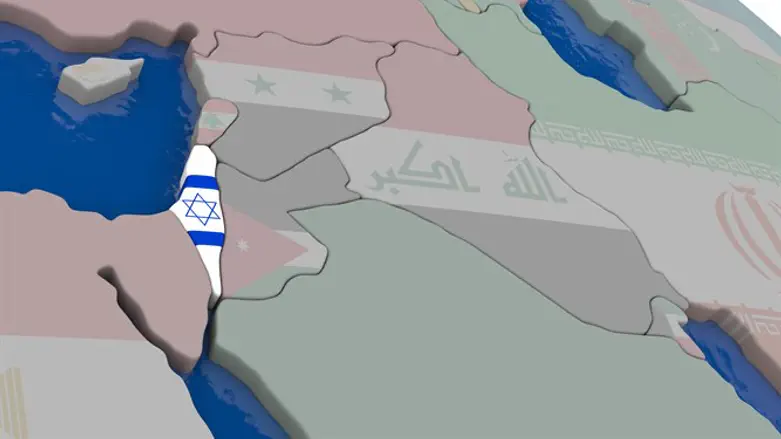
Today, November 29, marks the anniversary of the non-binding United Nations General Assembly Resolution 181, which endorsed the partition of the British Mandate of Palestine into a Jewish and an Arab state in the Land of Israel.
Ze’ev Jabotinsky, the grandson of the father of Revisionist Zionism who bore the same name, is a scholar who has probed the issue of Israel's rights under international law.
In an interview with Arutz Sheva, Jabotinsky asserted that the Partition Plan pushed by UN General Assembly Resolution 181 was, in fact, not in accordance with international law.
"The decision is contrary to international law, it’s very simple. We are commemorating the wrong event. The November 29 decision was made in contravention of the UN Charter. It was passed by the General Assembly, which sent a committee to examine the situation in Palestine and make recommendations, and the recommendations that were submitted were not adopted by those who were supposed to accept them: The British Mandate, and not the Arabs, as many think. The Mandate did not accept and did not fulfill the recommendations."
"Why recommendations? Because any resolution adopted at the United Nations Assembly is considered a recommendation rather than an operative decision. An operative decision is only made under Article 7 of the UN Charter and the Security Council."
"The recommendation was not accepted, and there are those who might think that as a result, the legal basis for our rights to the Land of Israel had been dropped, but this is not the case. The international legal basis was established on another date, which we do not celebrate and do not mention at school. This is when the League of Nations adopted the British Mandate in a vote in which all the League members unanimously accepted the Mandate and thus the Mandate became international law, and in this Mandate the rights of the Jewish people to establish a national home in the Land of Israel are recognized."
"It was part of the process that began with the Balfour Declaration, which was a declaration of intentions by the British government and a kind of commitment, but it was not yet part of international law. It was passed through the Paris Peace Conference, where an international hearing was held on who would be the sovereign nation in the Land of Israel. King Faisal, who was at that time considered king of all the Arabs, was invited there. He received from the British a promise of control over the whole of the Middle East. The British could not fulfill this promise because part of his kingdom was supposed to be Syria, and the French had been promised Syria and Lebanon. A clash ensued and the British crowned him over Iraq and his brother over what today is called Jordan.
"The British Mandate obliged the British to grant the Jewish people via the Zionist movement sovereignty over the Land of Israel if the Jews became the majority in the Land of Israel, and that is essentially the source of our right in international law. When Ben Gurion declared the state, he did it eight hours before the end of the British Mandate, in order to step into the shoes of those rights. Therefore, according to international law, only the Jewish people has the right to sovereignty by means of the Zionist movement over the western Land of Israel - at first it also included the eastern side of the Land of Israel, but we gave up the eastern part."
In Jabotinsky's view, the Jewish people marks the wrong date when it celebrates November 29, while it is really worth marking the day when the international legal right of the Jewish people to the Land of Israel began: July 24, 1922, the day of the ratification of the British Mandate, in which the decision to grant the Jewish people the right to reestablish their national home in the Land of Israel appears.
"The word 'reestablish' is important because it recognizes the historical right of the Jewish people to the land."
Jabotinsky added that "the only body that could have been authorized to relinquish rights granted to the Jewish people by the League of Nations is an elected body of the Zionist movement. This body made no decision to relinquish rights. What actually happened is that the Arab countries tried to completely erase the Zionist enterprise, failed in this, but succeeded in conquering parts of the western Land of Israel - but that does not mean that we agreed to it."
"The only body that can give up [our right to the land] today is the Knesset because it is the sovereign and representative of the Zionist movement that brought about the establishment of the Knesset. Not the Prime Minister, and not the government, but the Knesset is the sovereign representative - or the people in a referendum.”
As for the Oslo Accords, which may include recognition of another sovereign in Judea and Samaria, namely, the Palestinian entity, Jabotinsky said that even in these agreements it was decided to postpone the discussion of sovereignty to the permanent discussions between the parties. Jabotinsky mentioned that the Oslo accords were supposed to have been concluded within five years, and that after this period ended, they are no longer relevant according to international law.